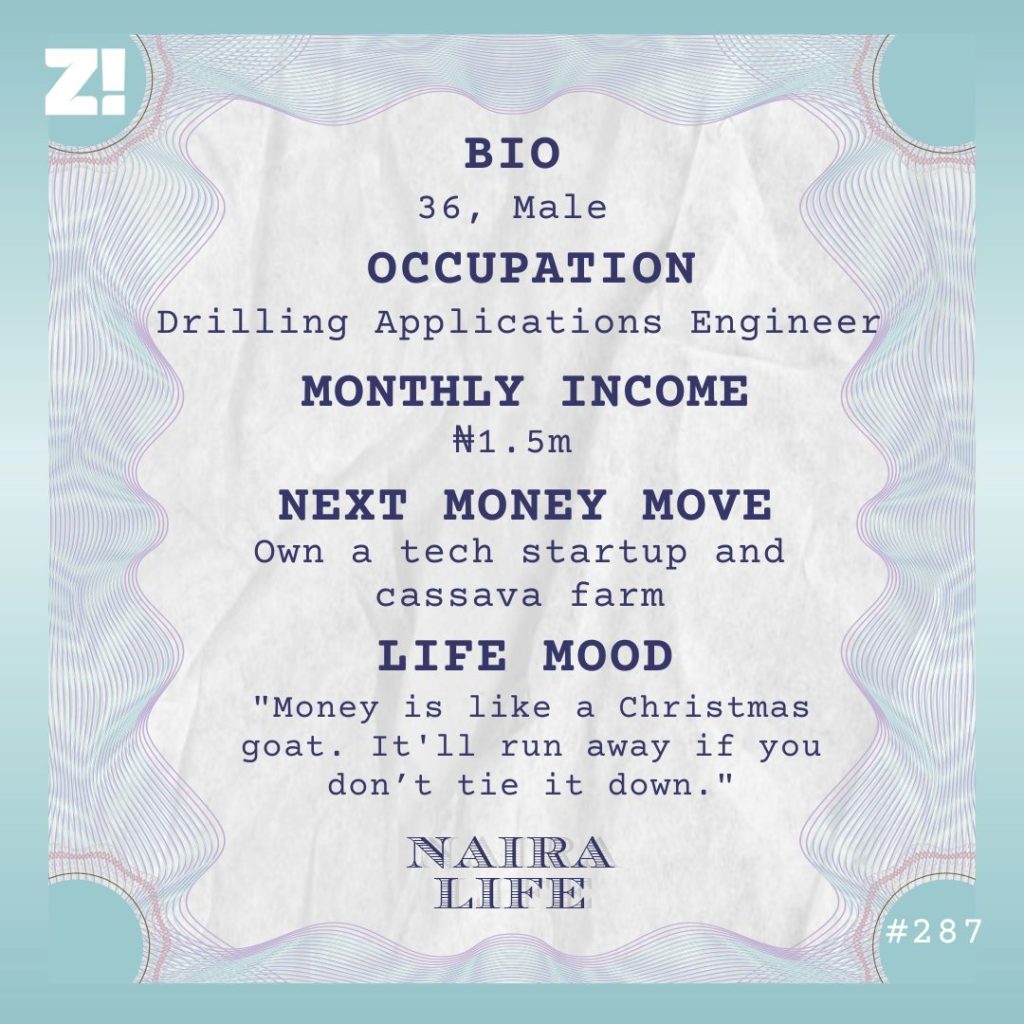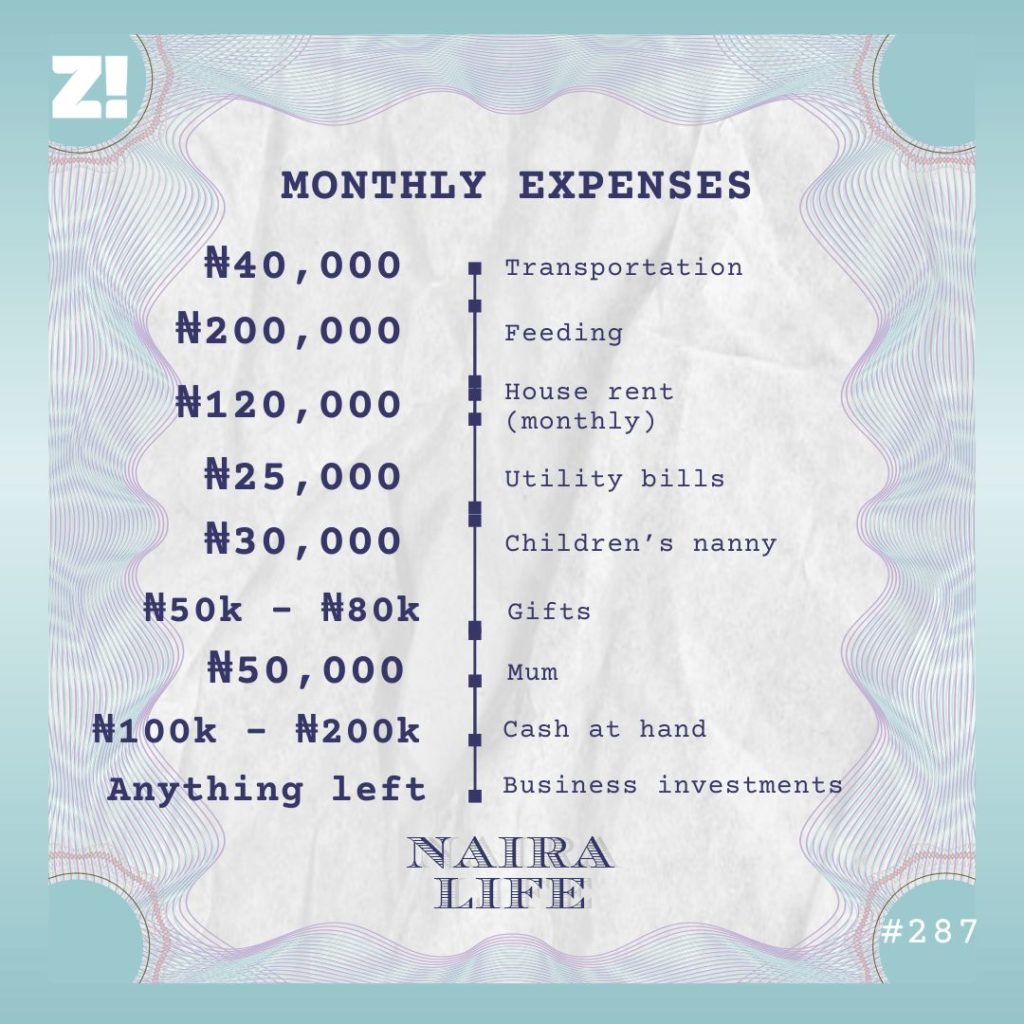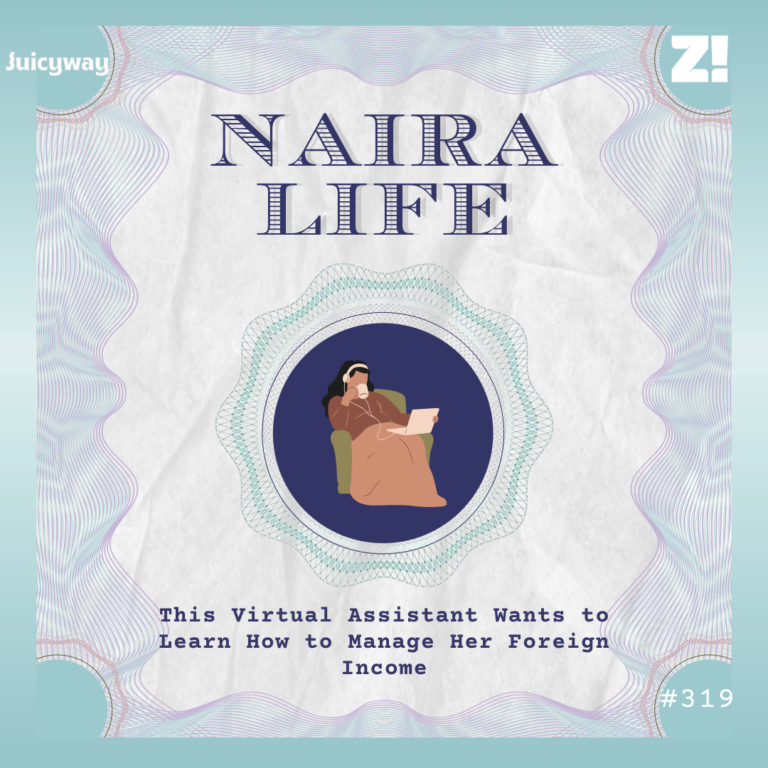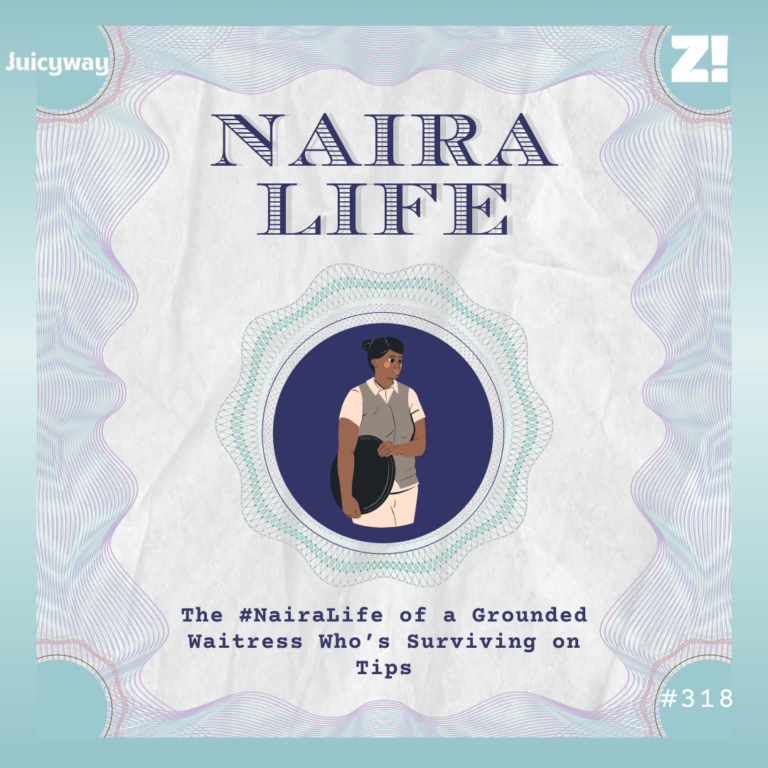Every week, Zikoko seeks to understand how people move the Naira in and out of their lives. Some stories will be struggle-ish, others will be bougie. All the time, it’ll be revealing.

What’s your earliest memory of money?
In Primary 1, I sold my biscuits to my classmates for money. My parents gave me biscuits to school, but I preferred money. Money meant I could buy anything I wanted and not be limited to biscuits.
So, I sold the biscuits for ₦3 even though they were worth ₦5. Then, I spent ₦1 on sweets and saved ₦2. This was in 1993, so there were still ₦1 sweets. I did that till my elder sister found out after some weeks when she saw money with me and snitched.
Yikes. Were you punished?
No, but my parents held a family meeting. They wanted to understand why I sold my biscuits cheaper just because I wanted money. Like, what did I need the money for?
I don’t remember what I told them, but they started giving me ₦3 to school instead of the biscuits. I continued buying sweets and saving what was left. Every month, I’d give my mum what I’d saved and ask her to add money to buy me a shirt or anything that caught my interest. It was a good arrangement.
Tell me more about what growing up was like, financially
I was born with a silver spoon and lost it along the way. My dad was a big-time contractor and businessman; he had a printing press and a real estate business. My mum was a full housewife who also made aso ofi at home.
Unfortunately, our fortunes started to change around 1995. My dad bought a German company that was exiting Nigeria without knowing the company was already going under. He told me much later that the deal had cost him ₦35m — big money back then — and he’d also taken some loans from the bank.
When the company eventually folded up, we had to move to a smaller house, and my mum lost all her aso ofi customers. I must’ve been 8 when it happened, and I saw how we slowly went from wealthy to struggling.
What were some of the things that came with this major change?
First, we didn’t have a driver to take my siblings and me to school anymore. Then we started taking danfo buses. I also transferred to a nearby, less expensive school.
The Christmas clothes also stopped coming, and people stopped visiting us. Usually, during festive seasons, many visitors came to ask my dad for money, but that stopped.
My dad didn’t get as many contracts as he used to. He lost some of his influential friends due to his bank debt. However, he managed to sponsor me and my siblings through school by selling many of the landed properties he’d acquired.
Sounds tough. Do you remember the first time you worked for money?
That happened after graduating secondary school in 2005. I couldn’t start uni immediately because two of my elder sisters were in the polytechnic, and my dad couldn’t afford to send more children to school at the time.
So, I picked up a ₦2500/month teaching job at a small private school. Apart from the salary, I made small change teaching after-school lessons. The school charged each student ₦20 daily for those lessons, and the proprietor shared the money amongst the teachers. Sometimes, I made ₦100 extra, sometimes ₦800. It depended on how many students paid per day.
I worked at the school for two years until I started university in 2007. Because of our financial situation, I barely got an allowance from home. When the allowance came, it was between ₦3k – ₦5k for a month. So, I had to do several hustles to support myself.
What kind of hustles?
I joined the decoration unit of my university fellowship and often got small gigs outside the fellowship. They weren’t paid gigs, but I was fed before and after the job.
Sometimes, I got actual decoration gigs that paid in cash, and I had to share the money with the unit members I took to assist me. My share at the end of these jobs was mostly ₦5k.
When I was extra broke, I’d gather ₦200 each from a few friends and tell them to come eat in my room. Then, I’d buy foodstuff at the market and cook enough rice. It worked out because the portions I served were more than what my friends would get with ₦200 at the cafeteria, and I also got to eat out of the food.
That was how I survived university till I graduated in 2011.
What did you do next?
I worked as a manager at a clubhouse for six months, earning ₦12k/month before I left for NYSC in 2012.
My place of primary assignment was a school, and I wasn’t paid a salary. However, the local government paid me ₦1500/month, while the state government paid ₦5k/month. Then there was the ₦19800 allowance from NYSC.
I supplemented my income by transporting food items for fellow corps members. I served in the North, so whenever I was returning home, I’d ask them to give me a list of things they wanted me to bring back to the North— anything from beans and garri to gadgets.
Some of them even bought on credit and paid me in installments. I didn’t mind because I added healthy profits. I could buy a UK-used BlackBerry phone for ₦25k and sell it for ₦35k. I made ₦30k-₦50k monthly from that business.
Not bad
I didn’t pay for rent as I lived in a lodge, so I saved most of my income after the food and travel costs. I also applied for a master’s program during this time. The plan was to start my master’s degree immediately after NYSC.
I finished NYSC in 2013 and invested in a hire-purchase taxi business just before returning to school. I bought a local taxi for ₦320k and gave it to a driver who paid ₦15k weekly. The agreement was for him to pay ₦650k and then own the taxi afterwards. The weekly payment delivery essentially supported me through postgraduate school, which I finished in 2015.
What happened after postgraduate school?
I became a network marketer at a company that sold nutritional supplements. To work with the company, I registered with ₦36k. I had the option of selling the products or recruiting other people to join, and I chose the latter because I didn’t like the idea of selling products.
I earned ₦9500 for each person I recruited, and there were months when money didn’t come in at all. Then, sometimes, payments would come in quick succession, up to ₦100k. It was tough, but I had no other option, so I stuck with it.
The only positive thing about that job was that I learned to sound convincing and market anything to anybody. I also travelled a lot around Nigeria.
But how did you survive if payment wasn’t regular?
My fiancée had a job, and she often helped me out with cash. I also registered more accounts on the network company to increase my earnings through recruits; I went from having one account to 15, which helped the payments become a bit more regular.
Then, in 2016, I joined MMM. I made a lot of money at first — I already knew how to canvas people and got great referral bonuses. Then, I got carried away and joined a few other Ponzi schemes —Twinkas, Helping Hands, Donation Hub, etc. Anyway, I received sense when I lost about ₦6.5m after the schemes crashed.
Damn
I lost almost all I’d made from the networking marketing job and all the profit from the Ponzi schemes. I lived in a ₦65k/year apartment, but I started owing rent because I couldn’t pay it.
I tried to go into dog dealing to make money quickly, but I gave the dogs out after a few weeks. I was using all my money to feed the dogs, and I was starving myself. I decided it wasn’t worth it and focused on my job at the network company. Thankfully, I’d used some of my MMM money to rent an office space, so I decided to intensify my efforts.
I made reasonable money for a while. I got a car, got married, and things were reasonably okay. But I started having second thoughts about the network company.
What happened?
I started questioning my morality. I was good at what I did; I could convince people to join. But then these people joined and didn’t know how to do the same, so they didn’t make money.
Once, I recruited someone who used his house rent to register after hearing me speak. Unfortunately, he didn’t make money, and the landlord nearly chased him out. Another did the same with his child’s school fees. I became uncomfortable with the whole system; it was starting to look a lot like MMM. So, I quit in 2018 even though I had no alternative.
That’s when sapa hit me full-time. I lost my dad earlier in the year, which affected me mentally, and I couldn’t think of business ideas. I became extremely broke, and then my wife got pregnant. Things went downhill from there.
The baby came, and I sold my car to handle the bills. After some months, I moved my family to my parents’ house when I couldn’t afford rent anymore. Nine months after we had our first child, my wife became pregnant again.
Oh wow
There I was — broke, owing rent and trying to survive with a baby and another on the way. Also, my wife had left her job because of the babies and the fact that we changed locations.
I tried to make money from forex trading and crypto, but it was a series of ups and downs. I’d make money today and lose it the next day. I also had a stint driving cabs on an e-hailing app in 2019.
In 2020, I moved my family to a friend’s family house. It was a four-bedroom house, but we had access to two. My friend lived in one of the rooms with his wife. I lived in another room with my family and another friend who was also squatting. My wife and two children slept on the bed, and I and the other friend slept on the floor.
Later that year, a family member moved us to Lagos and rented an apartment for us. My wife got a small teaching job, which sustained us for a bit.
Were you still trading forex and crypto?
On and off, but it wasn’t profitable. In 2021, I landed a government contract to supply bricks for a project in my home state. I got it through some friends, and it was supposed to change my finances.
This is how these contracts work: the contractor funds the project and gets paid after different levels of completion. The contract was worth ₦40m, and I didn’t have money, so I borrowed it from a finance firm.
Unfortunately, the engineer overseeing the project wasn’t happy with me. He’d expected me to give him a ₦2m bribe, and when I didn’t, he decided to frustrate my payments. I finished the project in 2022 and was in a ₦40m+ debt.
Ah
It was a terrible period. The interest on the loan increased every day, and the finance firm threatened me several times.
At a point, the payments began coming in very small instalments. I had to involve a lawyer to retrieve the money when only ₦8m came in after several weeks. The lawyer’s fee sef was about ₦3m.
It took a year to get 90% of the project payment—about ₦36m. Thankfully, the finance firm understood my plight after I explained and gave me time to repay. I paid the ₦4m loan balance myself in 2023.
How did you do that?
I secured more contracts. I’m a restless person and don’t know how to sit back and watch, so I applied for several government contracts. In 2023, I got one to supply furniture to schools, made ₦2.5m, and used most of it to pay off some of the debt.
I got a job that same year and used part of my salary to pay off the balance until I cleared everything.
Tell me more about the job
The role was drilling engineer at a multinational oil company, a job I got by a stroke of luck. I was at a family friend’s event when someone randomly asked my wife if her husband needed a job. I sent my CV, got the interview invite and eventually got an offer — ₦1.4m/month, including bonuses.
I got promoted a few weeks ago, and my average salary is now ₦1.5m/month.
Whoosh. To think you were ₦40m in debt just about a year ago
It’s such a relief. My experience has taught me a big lesson: never give up. There were days I wanted to end it all, but I looked at my family and lost my nerve. Plus, I’m not a coward. I couldn’t run away from my problems.
However, there were days I tried to run. One evening, when I was still squatting with my friend, my baby was crying out of hunger, and there was nothing I could do. I just told my wife I was coming and walked out of the house. I switched off my phone and kept walking. I slept in a church that night.
I raised some money from a few people before I returned to the house the following morning. I found my wife crying, thinking something had happened to me.
Luckily, one of the guys we lived with borrowed her money that night so my baby could eat. I really felt terrible. As a man, I couldn’t feed myself, talk more of my family.
I’m sorry you went through that
2018 to 2022 were trying years for me, and I’m grateful they’re behind me now. I just kept telling myself that if I didn’t die during that period, everything would be fine. I also developed high blood pressure at some point. How many stories do I want to tell?
I can imagine. Have there been any lifestyle changes with the new income?
Well, I don’t owe rent again, and I can easily pay my kids’ school fees. My lifestyle hasn’t changed much except that I now invest heavily in different business ventures.
Aren’t you worried that some of your investments didn’t exactly do great in the past?
Nope. I face everything believing that I have God and no matter the outcome, I’ll survive. Moreover, business is in my DNA. I can’t do without it.
I’m currently investing in a tech startup designed to connect people globally via digital cooperative societies. My team and I are still in the app development and compliance stage, and I’ve spent over $2k on it.
I also leased some land to cultivate cassava and process garri in 2023, which cost me about ₦1.2m. I’d have started planting this year but couldn’t get farmers because I was busy with work. However, I intend to begin operations next year.
I also regularly pursue government contracts, which require constantly pumping in money. I have over ₦8m tied up in these contracts.
That’s a lot of money tied up in investments
I believe that money is like a Christmas goat. It’ll run away if you don’t tie it down, and your Christmas is gone. I’ll always spend money, so I think it’s better that it’s out there working for me.
That’s pretty much my relationship with money. I don’t believe in holding money; I either give it out, loan it, or invest it.
Let’s break down your typical monthly expenses

Is there anything you want right but can’t afford?
“Can’t afford” is relative, but I want three things: to get my tech startup running, move my family abroad while I stay back to hustle, and build a house. I’ll need about ₦5m to get the startup fully functional, and japa will cost a lot more.
I estimate I’ll need about ₦35m – ₦50m to build a house. I can’t get that from my salary, which is why I’m always on the lookout for contracts and business opportunities.
How would you rate your financial happiness on a scale of 1 -10?
4.5. I’m grateful for where I am, but more must be done. I really want to influence society and help people, which is why I’m keen on the startup. It’ll help me reach as many people as possible and play a role in people’s lives.
If you’re interested in talking about your Naira Life story, this is a good place to start.
Find all the past Naira Life stories here.





